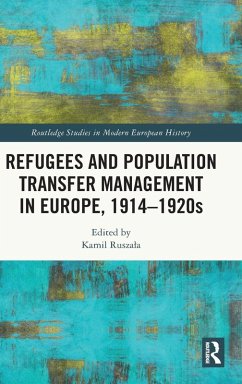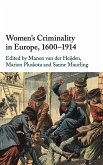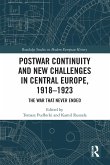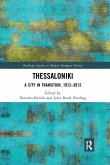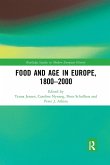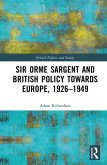Refugees and Population Transfer Management in Europe, 1914-1920s
Herausgeber: Rusza¿a, Kamil
Refugees and Population Transfer Management in Europe, 1914-1920s
Herausgeber: Rusza¿a, Kamil
- Gebundenes Buch
- Merkliste
- Auf die Merkliste
- Bewerten Bewerten
- Teilen
- Produkt teilen
- Produkterinnerung
- Produkterinnerung
This book provides a comprehensive study of refugee movements and population transfers across Europe during World War 1 and the early postwar period.
Andere Kunden interessierten sich auch für
![Women's Criminality in Europe, 1600-1914 Women's Criminality in Europe, 1600-1914]() Women's Criminality in Europe, 1600-191497,99 €
Women's Criminality in Europe, 1600-191497,99 €![Cities and the Making of Modern Europe, 1750-1914 Cities and the Making of Modern Europe, 1750-1914]() Andrew Lees (New Jersey Rutgers University)Cities and the Making of Modern Europe, 1750-1914114,99 €
Andrew Lees (New Jersey Rutgers University)Cities and the Making of Modern Europe, 1750-1914114,99 €![Postwar Continuity and New Challenges in Central Europe, 1918-1923 Postwar Continuity and New Challenges in Central Europe, 1918-1923]() Postwar Continuity and New Challenges in Central Europe, 1918-192342,99 €
Postwar Continuity and New Challenges in Central Europe, 1918-192342,99 €![Thessaloniki Thessaloniki]() Thessaloniki42,99 €
Thessaloniki42,99 €![Food and Age in Europe, 1800-2000 Food and Age in Europe, 1800-2000]() Food and Age in Europe, 1800-200045,99 €
Food and Age in Europe, 1800-200045,99 €![Colonial Soldiers in Europe, 1914-1945 Colonial Soldiers in Europe, 1914-1945]() Colonial Soldiers in Europe, 1914-194568,99 €
Colonial Soldiers in Europe, 1914-194568,99 €![Sir Orme Sargent and British Policy Towards Europe, 1926-1949 Sir Orme Sargent and British Policy Towards Europe, 1926-1949]() Adam RichardsonSir Orme Sargent and British Policy Towards Europe, 1926-1949148,99 €
Adam RichardsonSir Orme Sargent and British Policy Towards Europe, 1926-1949148,99 €-
-
-
This book provides a comprehensive study of refugee movements and population transfers across Europe during World War 1 and the early postwar period.
Hinweis: Dieser Artikel kann nur an eine deutsche Lieferadresse ausgeliefert werden.
Hinweis: Dieser Artikel kann nur an eine deutsche Lieferadresse ausgeliefert werden.
Produktdetails
- Produktdetails
- Routledge Studies in Modern European History
- Verlag: Taylor & Francis Ltd
- Seitenzahl: 354
- Erscheinungstermin: 20. August 2024
- Englisch
- Abmessung: 240mm x 161mm x 24mm
- Gewicht: 744g
- ISBN-13: 9781032751627
- ISBN-10: 1032751622
- Artikelnr.: 70367113
- Herstellerkennzeichnung
- Libri GmbH
- Europaallee 1
- 36244 Bad Hersfeld
- gpsr@libri.de
- Routledge Studies in Modern European History
- Verlag: Taylor & Francis Ltd
- Seitenzahl: 354
- Erscheinungstermin: 20. August 2024
- Englisch
- Abmessung: 240mm x 161mm x 24mm
- Gewicht: 744g
- ISBN-13: 9781032751627
- ISBN-10: 1032751622
- Artikelnr.: 70367113
- Herstellerkennzeichnung
- Libri GmbH
- Europaallee 1
- 36244 Bad Hersfeld
- gpsr@libri.de
Kamil Ruszäa is Assistant Professor in Modern History at Jagiellonian University, specializing in East Central Europe in the 19th to 20th centuries, with a particular focus on the Habsburg Empire, the First World War, post-imperial transformation, refugees and migrants, as well as war commemoration and heritage.
PART 1: Refugees and (post)war migrants as lessons from the past 1. War refugees: an Endless Journey? Lessons from the past and present Kamil Ruszäa 2. Refugees in the Greater War: still a long way to go? Peter Gatrell PART 2: State Control, Political Tool and Refugees 3. "Under such extraordinary circumstances": the Norwegian state's attempt at defining and controlling refugees and migrants during the First World War Eirik Brazier, Nik Brandal 4. Refugees as a "political tool": the propaganda of the "Prokuden zemedelec" and "Osvobodenie" newspapers (1920-1923) Tsvetelina Tsvetkova PART 3: Refugee Camps and Beyond 5. National mobilization, humanitarian agency from Below, and wartime authorities: Polish refugees from Galicia in Salzburg during the First World War Kamil Ruszäa 6. The others: refugees seen from the Slovenian perspective of the First World War Gregor Antoli
i
, Petra Svoljak 7. "National consciousness and honor are not betrayed anywhere": the organization and self-organization of Ukrainian refugees in Gmünd camp (1915-1918) Iryna Orlevych, Nataliia Kolb 8. Rumors, imperial "humanitarianism" and the destruction of the Armenian refugee camps in Syria and Lebanon, 1918-1926 Victoria Abrahamyan PART 4: Refugees and humanitarianism 9. Civic humanitarianism: Glasgow, the Great War and Belgian refugees Kieran Taylor 10. Non-governmental assistance to Latvian refugees after 1918: the involvement of the Latvian diaspora Kristine Bekere PART 5: Postwar Population Order 11. Population changes in Latvia 1914-1920: the refugee factor Eriks Jekabsons 12. (Regular) Immigration Controls in the Interwar (Semi-)Periphery? East-Central- and Southeast European Policy Patterns, 1918-1928 Aleksandar R. Mileti
13. Where did they come from? The composition of the Polish population in 1921 as a result of war-related migratory movement Bartosz Ogórek 14. Statelessness and the limits of national sovereignty. German and Russian refugees in the early Weimar Republic Anna Mashi
i
, Petra Svoljak 7. "National consciousness and honor are not betrayed anywhere": the organization and self-organization of Ukrainian refugees in Gmünd camp (1915-1918) Iryna Orlevych, Nataliia Kolb 8. Rumors, imperial "humanitarianism" and the destruction of the Armenian refugee camps in Syria and Lebanon, 1918-1926 Victoria Abrahamyan PART 4: Refugees and humanitarianism 9. Civic humanitarianism: Glasgow, the Great War and Belgian refugees Kieran Taylor 10. Non-governmental assistance to Latvian refugees after 1918: the involvement of the Latvian diaspora Kristine Bekere PART 5: Postwar Population Order 11. Population changes in Latvia 1914-1920: the refugee factor Eriks Jekabsons 12. (Regular) Immigration Controls in the Interwar (Semi-)Periphery? East-Central- and Southeast European Policy Patterns, 1918-1928 Aleksandar R. Mileti
13. Where did they come from? The composition of the Polish population in 1921 as a result of war-related migratory movement Bartosz Ogórek 14. Statelessness and the limits of national sovereignty. German and Russian refugees in the early Weimar Republic Anna Mashi
PART 1: Refugees and (post)war migrants as lessons from the past 1. War refugees: an Endless Journey? Lessons from the past and present Kamil Ruszäa 2. Refugees in the Greater War: still a long way to go? Peter Gatrell PART 2: State Control, Political Tool and Refugees 3. "Under such extraordinary circumstances": the Norwegian state's attempt at defining and controlling refugees and migrants during the First World War Eirik Brazier, Nik Brandal 4. Refugees as a "political tool": the propaganda of the "Prokuden zemedelec" and "Osvobodenie" newspapers (1920-1923) Tsvetelina Tsvetkova PART 3: Refugee Camps and Beyond 5. National mobilization, humanitarian agency from Below, and wartime authorities: Polish refugees from Galicia in Salzburg during the First World War Kamil Ruszäa 6. The others: refugees seen from the Slovenian perspective of the First World War Gregor Antoli
i
, Petra Svoljak 7. "National consciousness and honor are not betrayed anywhere": the organization and self-organization of Ukrainian refugees in Gmünd camp (1915-1918) Iryna Orlevych, Nataliia Kolb 8. Rumors, imperial "humanitarianism" and the destruction of the Armenian refugee camps in Syria and Lebanon, 1918-1926 Victoria Abrahamyan PART 4: Refugees and humanitarianism 9. Civic humanitarianism: Glasgow, the Great War and Belgian refugees Kieran Taylor 10. Non-governmental assistance to Latvian refugees after 1918: the involvement of the Latvian diaspora Kristine Bekere PART 5: Postwar Population Order 11. Population changes in Latvia 1914-1920: the refugee factor Eriks Jekabsons 12. (Regular) Immigration Controls in the Interwar (Semi-)Periphery? East-Central- and Southeast European Policy Patterns, 1918-1928 Aleksandar R. Mileti
13. Where did they come from? The composition of the Polish population in 1921 as a result of war-related migratory movement Bartosz Ogórek 14. Statelessness and the limits of national sovereignty. German and Russian refugees in the early Weimar Republic Anna Mashi
i
, Petra Svoljak 7. "National consciousness and honor are not betrayed anywhere": the organization and self-organization of Ukrainian refugees in Gmünd camp (1915-1918) Iryna Orlevych, Nataliia Kolb 8. Rumors, imperial "humanitarianism" and the destruction of the Armenian refugee camps in Syria and Lebanon, 1918-1926 Victoria Abrahamyan PART 4: Refugees and humanitarianism 9. Civic humanitarianism: Glasgow, the Great War and Belgian refugees Kieran Taylor 10. Non-governmental assistance to Latvian refugees after 1918: the involvement of the Latvian diaspora Kristine Bekere PART 5: Postwar Population Order 11. Population changes in Latvia 1914-1920: the refugee factor Eriks Jekabsons 12. (Regular) Immigration Controls in the Interwar (Semi-)Periphery? East-Central- and Southeast European Policy Patterns, 1918-1928 Aleksandar R. Mileti
13. Where did they come from? The composition of the Polish population in 1921 as a result of war-related migratory movement Bartosz Ogórek 14. Statelessness and the limits of national sovereignty. German and Russian refugees in the early Weimar Republic Anna Mashi

